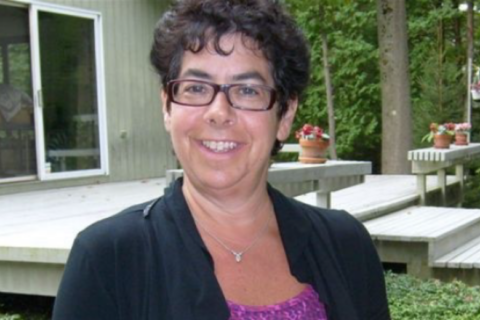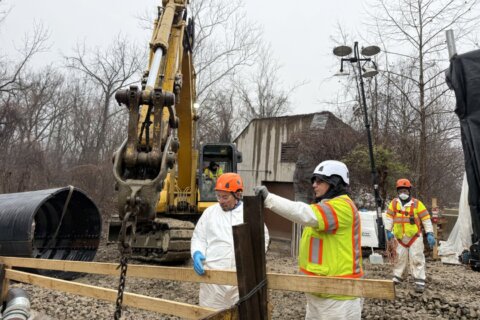Four years ago, Tony Antonelli, of Gaithersburg, Maryland, thought he got a new lease on life when his wife donated one of her kidneys to him. But that kidney eventually started failing too.
Dan Reynolds said he could tell that last fall, as the two were talking outside Tony’s garage.
Reynolds retired from the Army after 22 years of service. For a while he was homeless, but now lives and works around Gaithersburg as a handy man. For years he’s done projects big and small for the Antonellis.
As he finished up one project last October, “I noticed that he wasn’t looking that good at all,” Reynolds said. “I asked him if he was okay.”
That’s when Tony Antonelli revealed his kidney was failing. After Reynolds found out they shared the same blood type, “I was like, well, I’d be honored, I’d be happy, to give you one of mine if it’ll work out,” Reynolds recounted.
Tony rushed Mary Antonelli, Tony’s wife of 43 years, outside so she could hear the offer. “All through my head was ‘Oh my God, are you kidding me? How can this be?’,” she said. “I just started crying.”
Thousands of people around the D.C. area are on the waiting list for a new kidney right now, though the number of transplants recorded in D.C., Maryland and Virginia every year doesn’t come close to meeting the need.
According to the American Kidney Fund, 13 people around the country die every day because they never found a match.
Dan had to go through a months-long barrage of tests to make sure there really was a match. Even during the height of COVID-19 outbreaks, he didn’t shy away from visits to the doctor and all the tests that came with it.
“It’s well worth it,” Reynolds said on a Zoom call with Mary. “I’d do it again 100 times if I had to.”
“That’s just what he said to me in the recovery room,” Mary said. “He says ‘I’d do it 100 times again, Mary. We want our buddy to feel better. We just want him to feel better.’”
The transplant happened Feb. 23. Tony has had some minor setbacks in his recovery, but his family is hopeful he’ll be out of the hospital by Monday or Tuesday of next week.
Dan is out of the hospital and recovering at his daughter’s home in Silver Spring. He’s adamant that what he did is “absolutely not a big deal.”
But the recovery process also means that Dan isn’t working right now. It’s illegal to compensate someone for a donation (OrganDonor.gov says Congress passed the law to make sure the wealthy don’t have an unfair advantage obtaining donated organs and tissues), so a GoFundMe has been set up and the Antonellis are doing everything they can to raise awareness of what Dan did and help him cover expenses.
While they’ve traded a couple of phone calls and text messages, a shared Zoom call today was the first time they’d seen each other since the operation.
“He sent me a picture this morning; I said ‘God you look great!,” Mary said. “And I’m so thankful.”
“When I get back over that way, I know around our area I have a lot of home cooking coming,” Dan said with a laugh.
“You got that right!” Mary said. “Dan has always been slim and trim, I’m telling you, but Dan might be getting a little bit heavier.”
“I’m going to have to watch that but I know the area and the people are very, very nice all around our whole area there,” Reynolds said. “I’m kind of looking forward to it.”
The Antonellis have three children and 13 grandchildren. But in their minds, Dan Reynolds, who started this journey as a friendly acquaintance, is family now too.
“There’s not enough words to say how I feel and how Tony feels about this great gift and this great man,” Mary said. “When you have 13 grandchildren, you have a lot of life to live and a lot of things to enjoy in life. And that’s what Dan has given us. The possibility to really enjoy our lives and our family and our friends and the gifts we’ve been given to a fuller degree.”








